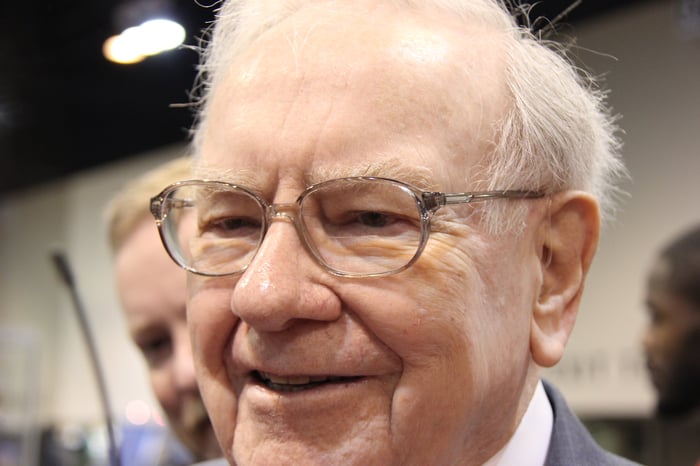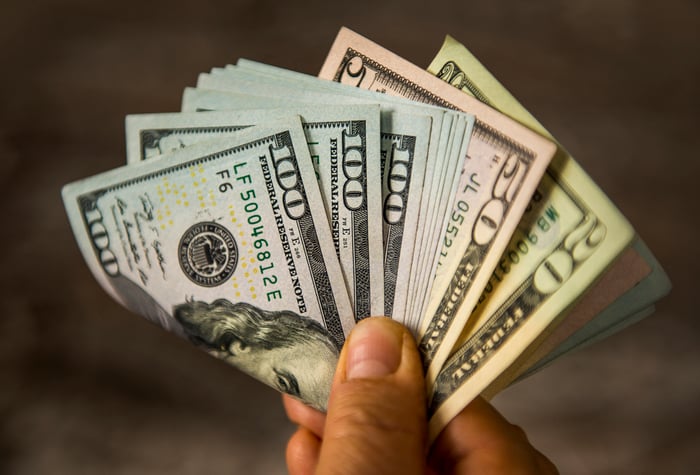For nearly 60 years, Berkshire Hathaway (BRK.A 0.77%) (BRK.B 0.88%) CEO Warren Buffett has been dazzling Wall Street with his investing prowess. Since taking the reins at Berkshire Hathaway in 1965, he's led his company's Class A shares (BRK.A) to an aggregate gain of 3,787,464%, as of Dec. 31, 2022. That's 153 times better than the 24,708% return, including dividends paid, for the broad-based S&P 500 over the same time frame.
The Oracle of Omaha's substantial outperformance is a based on a long list of factors, including his long-term ethos, highly concentrated investment portfolio, and narrow research focus, which allows him to become an expert in certain industries and sectors. However, it's Buffett's penchant for dividend stocks that's, arguably, played the biggest role in Berkshire Hathaway's long-term success.

Berkshire Hathaway CEO Warren Buffett. Image source: The Motley Fool.
Dividend stocks have been Buffett's secret sauce for decades
Warren Buffett and his investing lieutenants, Ted Weschler and Todd Combs, gravitate to income stocks for a variety of reasons. For one, dividend-paying companies are almost always recurringly profitable -- and a profitable business is one that usually doesn't require constant oversight by investors.
To add to this point, dividend stocks are usually time-tested. A company wouldn't be paying a recurring quarterly or annual dividend if it hadn't demonstrated to investors that it can successfully navigate an economic downturn.
Furthermore, dividend stocks have absolutely crushed non-dividend-paying companies in the return column, when examined over long periods. According to a study unveiled by J.P. Morgan Asset Management, a division of money-center bank JPMorgan Chase, the annualized return for companies that initiated and grew their payouts between 1972 and 2012 was nearly 500% higher than companies that didn't pay a dividend -- 9.5% vs.1.6%.
In 2023, Berkshire Hathaway is on pace to collect more than $6 billion in dividend income. However, not all dividend stocks within the Oracle of Omaha's $327 billion investment portfolio are created equally.

Image source: Getty Images.
How does a 57% annual yield sound?
By definition, a high-yield dividend stock is a company doling out a yield of 4% or above. Berkshire Hathaway has a couple of companies in its portfolio floating just above this 4% "high-yield" threshold, including Kraft Heinz (4.14% yield), Paramount Global (4.3% yield), and U.S. Bancorp (4.15% yield).
But these are nominal yields and represent what an investor can expect to receive if buying stakes in these companies right now. For long-term investors who've relied on time as an ally, the yield they receive, relative to their cost basis, can be significantly higher.
Among the thousands of tradable securities, only around 40 sport dividend yields of at least 10% and a market cap of more than $2 billion. Comparatively, Warren Buffett is collecting a nearly 57% annual yield on a stock Berkshire has been a continuous shareholder of for the past 35 years. I'm talking about none other than beverage stock Coca-Cola (KO 1.19%).
Based on figures published in Buffett's 2021 letter to shareholders, Berkshire Hathaway spent less than $1.3 billion amassing its 400-million-share position in Coca-Cola, which works out to a $3.2475-per-share cost basis. Last month, Coca-Cola announced it was increasing its base annual payout for a 61st consecutive year. The $1.84/share Coke will parse out to its shareholders in 2023 works out to a 56.7% yield, relative to cost, for Buffett's company.
Although Coca-Cola's nominal yield is only around 3%, Buffett's long-term vision -- and very low cost-basis in Coke stock -- is the catch that allows his company to more than double its initial investment from this payout alone every two years.
Leaning on time as an ally can lead to some eye-popping annual yields
Despite increasing its payout for 61 straight years, Coca-Cola's dividend streak shows no signs of slowing. It's a geographically diverse company that's operating in all but three countries worldwide, and its marketing efforts continue to find the mark with consumers young and old. Even though Coke isn't the growth story it was three decades, it's still able to move the needle given its strong branding and push to capture additional share in faster-growing emerging markets.
However, Coca-Cola isn't the only supercharged income stock in Berkshire Hathaway's portfolio. Longtime holdings American Express (AXP 4.64%) and Moody's (MCO -0.07%) are also producing jaw-dropping yields as a result of Buffett and his investment team being patient.
Berkshire Hathaway's position in American Express cost $1.287 billion across its more than 151.6 million shares held. This works out to a cost basis of $8.489 per share. With AmEx set to pay $2.40/share in dividends in 2023, Warren Buffett and his team will collect a 28.3% yield. Since American Express's payment processing and lending operations tend to grow in lockstep with the U.S. and global economy, it's likely we'll see this payout continue to climb over time.
Meanwhile, credit-ratings agency Moody's has been a continuous holding for more than two decades and has a cost basis of $248 million for Berkshire's more than 24.6-million-share stake. This works out to about $10.053 per share. In 2023, Moody's in on track to pay $3.08/share in dividends, which equates to a 30.6% yield on cost for Buffett's company.
The best part of the Oracle of Omaha's supercharged income strategy is that anyone can do it. When given enough time, dominant dividend-paying businesses have the potential to turn into what Coca-Cola, American Express, and Moody's have become for Warren Buffett.





